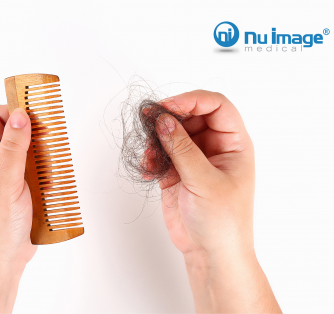Menu
Weight loss
Hormones
Sex
EXPLORE
MEET NU IMAGE MEDICAL
TREATMENTS
MEET NU IMAGE MEDICAL
TREATMENTS
MEET NU IMAGE MEDICAL
Hair Loss: Common Causes of Male and Female Hair Loss


Whether you are a male or a female losing your hair is not something you look forward to. In fact, research is showing a strong link between hair loss and depression. The psychological impact of hair loss can be debilitating and result in low self-esteem and loss of confidence. With so much anxiety surrounding the topic of hair loss, it's no wonder that people are concerned about the causes and risks associated with hair loss. Here are 4 common reasons for both male and female baldness.
Hereditary-Patterned Baldness
It is natural for men and women to show signs of hair thinning as a natural part of the aging process. However, for some people, they may begin to see drastic changes in their early 20's. Genetics is behind hereditary-patterned baldness and is the leading cause of both male and female hair loss. Thanks to the combination of hormones you inherited, you may experience early hair loss regardless of other risk factors and despite what you may have heard, you can't just blame your Mother's Father. More recent research supports the idea that your entire genetic makeup (from both parents) is what makes up your propensity toward hair loss.
Medical Conditions That Contribute to Hair Loss
There are multiple medical conditions that can result in hair loss. Alopecia is probably the most common medical condition people think of when discussing hair loss and disease. Alopecia is thought to be an autoimmune disease that results in patches of hair loss. Depending on the severity of the condition, it can be mild to complete resulting in small patches to full hair loss. Alopecia can affect just the hair on the head or hair all over the body including eyebrows, eyelashes, etc. At this time, there is no cure for Alopecia but there are some treatments that can help.
Ringworm is a dermatological fungal infection that can affect the scalp and can cause hair loss. The fungal infection of the scalp can result in severe inflammation which can result in scarring and permanent hair loss. Luckily, there are medications that your doctor can prescribe to control ringworm.
Other immune system related illnesses that can cause scarring that results in hair loss include lupus and lichen planus.
Hormonal Changes and Hair Loss
Hormones can be traced to so many things in our bodies and hair loss is no exception. Pregnancy is a common time for females to notice a change in their hair. Oftentimes, they may notice a surge of hair growth during pregnancy that may be due to an increase in estradiol and progesterone and even some of the prenatal vitamins as well. What happens after the baby is born is usually the opposite of the pregnancy glow. Many women say goodbye to their gorgeous new locks and notice hair loss in patches and an overall dulling to the hair. If their postpartum hair loss is due to normal hormone fluctuations they will likely see a complete recovery and regrowth of the lost hair.
Menopause is another hormonal time that can result in hair loss. Changes in levels of estrogen, testosterone and progesterone (similar to postpartum changes) can trigger hair loss, hot flashes and night sweats. While the night sweats and hot flashes can be extremely frustrating, most women cite the hair loss as one of the hardest things to accept with menopause.
The thyroid is also responsible for hormone regulation and can have a hand in hair loss. Hypothyroidism can cause the body to shut down what might be considered lesser important functions like hair, skin and metabolism. This can result in fatigue, depression, weight gain and hair loss.
Dihydrotestosterone or DHT is the hormone responsible for most male hair loss. DHT is an androgen and is considered a byproduct of testosterone. If you have a genetic predisposition to hair loss then DHT will likely bind to your hair follicles, weaken them and cause them to shrink and die.
Stress and Nutritional Causes
From stress to a poor diet, our hair can take a beating. High levels of stress can cause sudden (and usually temporary) hair loss. Whether you've experienced a huge emotional shock or an extended period of high-stress you may experience hair loss as a result. A poor diet can also lead to thinning hair due to a lack of nutrients. It is important to drink enough water and eat enough protein and nutrient-rich foods to keep your body healthy and that includes your hair.
Hair loss can be a complicated, emotionally taxing issue to deal with for men, women and children. Identifying the cause of the hair loss and working with a medical professional to treat the root of the issue, if possible, is key. By catching the problem early, you have a greater chance of slowing, stopping and reversing the hair loss.
Nu Image Medical® offers a new and futuristic approach to achieving optimal health and wellness. The company has been a weight loss, anti-aging and wellness provider since 2004 and offers medically supervised programs for medical weight loss, peptides, erectile dysfunction, scream cream, and hair loss (NuDew)
This article is for informational purposes only and does not constitute medical advice. The information contained herein is not a substitute for and should never be relied upon for professional medical advice. Always talk to your physician about the risks and benefits of any treatment. Nu Image Medical may not offer the medications or services mentioned in this article.
